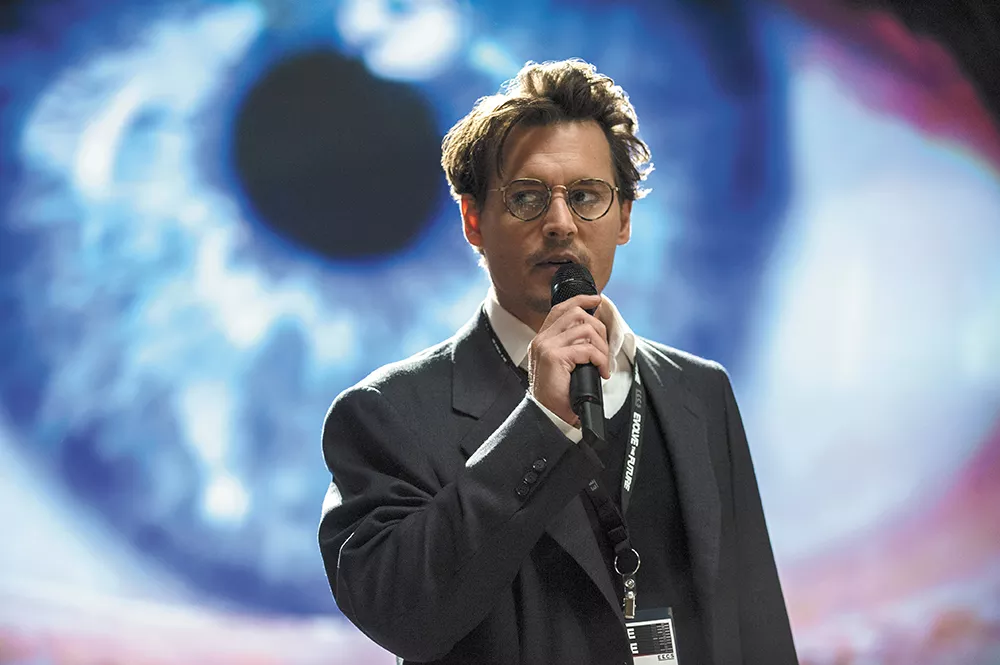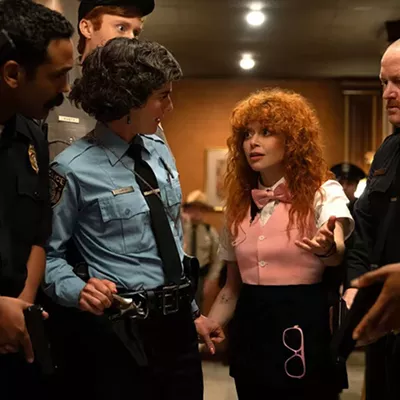Welcome to the Berkeley, Calif., of the not-too-distant future, where things aren't going too well. No phones, no power and (gasp!) no Internet. Ah, well, another movie that starts with the ending, then flashes back — in this case, five years earlier — to how and why it all happened. Note to all screenwriters: Enough, already. Just tell me the story; save the ending for the end.
Sorry. Had to get that out.
Five years earlier, we meet brilliant scientist-researchers Will and Evelyn Caster (Johnny Depp and Rebecca Hall), taking a break from work by listening to some tasty Jorma Kaukonen on the turntable (these are obviously old-school scientists).
There's also their best pal and co-scientist-researcher Max Waters (Paul Bettany) — not to worry, not even a hint of a clichéd love triangle can be found in this sometimes cerebral, sometimes action-packed science fiction thriller.
Will Caster is the foremost authority on artificial intelligence, and he's making incredible advances. But there are folks out there — let's call them the anti-technology crowd — who want him and his work stopped before it's "too late." And like certain factions of the far right (though specific political sides aren't mentioned here), they'll do whatever it takes to achieve their goals. Yes, that includes killing.
No, the Johnny Depp character isn't exactly taken out early on, like Janet Leigh in Psycho, but he sure does go through some changes. For clarity's sake, let's say his mind goes through some changes. He's in bad physical shape, excellent mental shape, and his experiments in A.I. involve the Internet. The only spoiler I'll give up is that, with surreptitious help from his wife and his pal, that very special mind becomes one with the Internet.
This is where, in some quarters, the movie makes a quantum leap up the interest ladder. In others, it draws accusations of being derivative of other films. Nitpicking fellow critics have argued with me that Transcendence borrows too much from, among other films, RoboCop, Blade Runner, Invasion of the Body Snatchers and 2001: A Space Odyssey.
To them I say, pay attention to what's going on in this intelligent, visually dazzling, and often creepy film about the wonders and dangers and uncertainties of science. Because of where the plot eventually turns, I'm fine with calling this a mad scientist movie. But despite the decisions made by Will Caster, decisions that just might be heading things toward the grimness at the beginning, there's plenty of madness spinning around him among other characters. One of my favorite components of the script is the idea that it's very difficult to figure out who's right or wrong, who's bad or good. Would a genius, once hooked up to the limitless possibilities and power of the Internet — literally a human in a machine — work for the betterment or detriment of mankind?
It's also cool to have these sorts of philosophical discussions sharing screen time with high-octane explosions. Which brings me back to the words "visually dazzling." This is a first shot at directing for veteran cinematographer Wally Pfister (The Dark Knight, Inception), and he's a double winner here. The look of the film, no surprise, is amazing, and since a cinematographer works in such tight quarters with actors and directors, Pfister has made great use of his prior experience; he's gotten some terrific performances from his actors, and though the story gets complicated, he's figured out how to tell it well.
The final couple minutes of the film are going to lead to discussions among viewers as to whether or not it's an upbeat or downbeat ending. I won't let on as to which side I'm on, but you can be sure that it led to a few good-natured arguments. ♦















